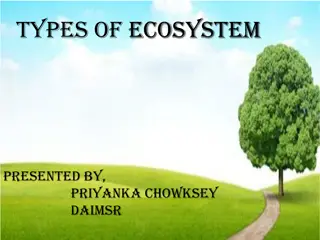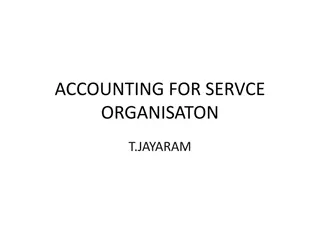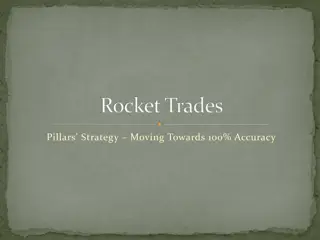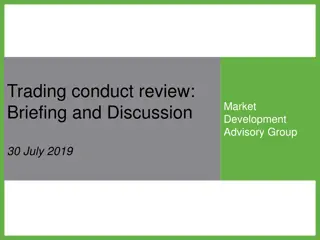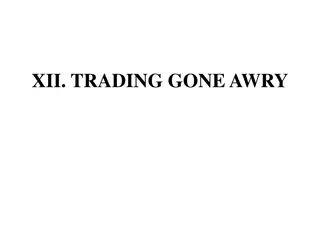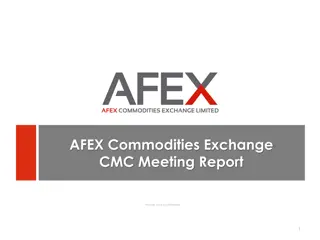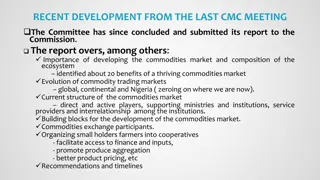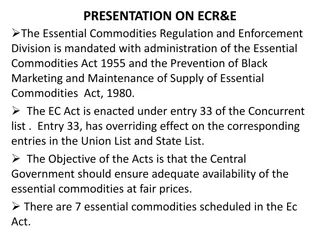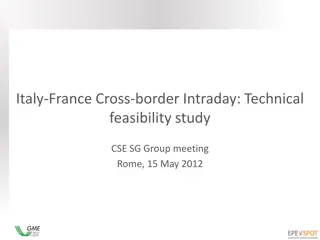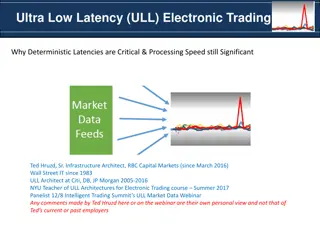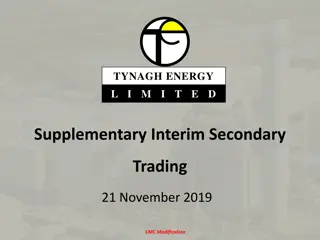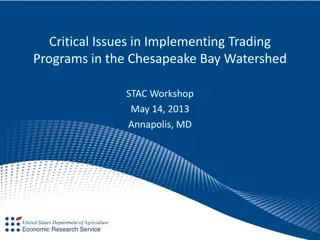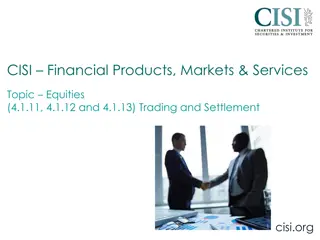Commodities Trading Ecosystem Implementation Plan
The Commodities Trading Ecosystem Implementation Plan outlines the key recommendations, timelines, and responsibilities for enhancing the commodities trading sector in Nigeria. It includes engagements with stakeholders, educational initiatives, warehouse mapping, capacity building, rules development, certification systems, workshops, and collaboration efforts to improve the trading environment. The plan aims to de-risk the agricultural sector, attract investors, and ensure efficiency and standardization in commodity trading.
Download Presentation

Please find below an Image/Link to download the presentation.
The content on the website is provided AS IS for your information and personal use only. It may not be sold, licensed, or shared on other websites without obtaining consent from the author.If you encounter any issues during the download, it is possible that the publisher has removed the file from their server.
You are allowed to download the files provided on this website for personal or commercial use, subject to the condition that they are used lawfully. All files are the property of their respective owners.
The content on the website is provided AS IS for your information and personal use only. It may not be sold, licensed, or shared on other websites without obtaining consent from the author.
E N D
Presentation Transcript
2018 3RD CAPITAL MARKET COMMITTEE MEETING Wednesday, 14th November, 2018 PRESENTATION OF THE COMMODITIES TRADING ECOSYSTEM IMPLEMENTATION COMMITEE
INTRODUCTION SEC has upgraded its commodities exchange unit to a Division and currently strengthening its capacity. It has reviewed the registration requirements for spot commodity trading and currently reviewing regulations generals, for spot commodity trading by the exchanges. The Committee has arranged a meeting with the Institute of Public Analysts of Nigeria (IPAN), SGS Inspection Services and Standards Organization of Nigeria on the 22nd of November 2018 on issues of grading and standardization of agricultural commodities that are currently traded and likely to be traded on the exchanges. The Committee and some of its members have engaged with some key stakeholders. The various sub-committees on education, conference and mapping of warehouses have made progress on their assignment. As part of the effort to de-risk the agricultural sector and improve its attraction to investors, the Committee is propose a small industry committee to include BOA and CBN to develop an agric based exchange tradable instrument / product.
COMMODITIES TRADING ECOSYSTEM IMPLEMENTATION DASHBOARD S/N RECOMMENDATION TIME LINE RESPONSIBILITY Engagement with critical stakeholders (Vice President, Federal Ministry of Finance, Federal Ministry of National Planning, Federal Ministry of Agriculture and Rural Development, Federal Ministry of Industry, Trade and Investment, Central Bank of Nigeria, Standard Organization of Nigeria, Nigerian Sovereign Investment Authority) 1 Q4 2018-Q1 2019 SEC, CAMMIC, Committee 2 Education and Enlightenment Roadmap Report Q4 2018 Committee International Stakeholder Conference (Proposal to be ready by January 2019) Committee ,SEC 3 Q3 2019-Q4 2019 4 Mapping of Warehouses Q1 2019 NCX, AFEX 5 Capacity building for Investment and Securities Tribunal Q1 2019 SEC 6 Rules for spot commodity market and other related rules Q1 2019 SEC 7 Rules on collateral management Q2 2019 SEC 8 Development of certification system for collateral managers Q2 2019 SEC, Committee
9 Workshop for collateral management companies Q1/Q2 2019 SEC 10 Engagement with logistic companies Q4 2018-Q1 2019 NCX, AFEX, SEC Commodity exchanges to provide price information through collaboration with Federal Ministry of Agriculture and Rural Development 11 Q3 2019 NCX, AFEX, FMARD, SEC NIRSAL, AFEX, FMARD, NCX, SEC 12 Organising farmers into cooperatives (pilot) Q4 2019 Engagement with Governors Forum for delegation of land matters to relevant agencies Work with Bank of Agriculture to develop agric based instruments that will be attractive to investors (sub- committee to be set up) Introduce risk-based capital for non-spot commodities market operators 13 Q3 2019 CAMMIC, SEC 14 Q4 2018 SEC 15 Q1 2019 SEC Engage with SON to develop efficient grading and standardization system for agriculture and solid minerals 16 Q2 2019 SEC, Committee
INTERNATIONAL CONFERENCE ON COMMODITY EXCHANGE Theme: Commodity Exchange: Key to diversifying Nigeria s economy. Structure of Conference: No of Days 2 3 days Proposed Discussion Points: Enabling Environment for a functioning commodity trading ecosystem Geo-cooperatives: organizing farmers the smart way Transforming existing infrastructure to meet commodity exchange demands The African Experience Lessons learned from Commodity Exchanges in Africa Quality Control: GAP, Standardization and supporting regulation The role of Government vs. Private Investors Nigeria s key commodities and global position/potential Warehouse Receipting: Lessons learned from Ethiopia Commodity Exchange Commodity exchanges and Derivatives market Developmental Challenges on commodity exchange in Africa Innovative Mechanism in Global commodity exchanges What will a functioning commodity exchange ecosystem bring to Nigeria s economy? What are the major trends and developments in commodity exchanges around the World Cryptocurrencies, Blockchain Technologies in the commodities exchange ecosystem.
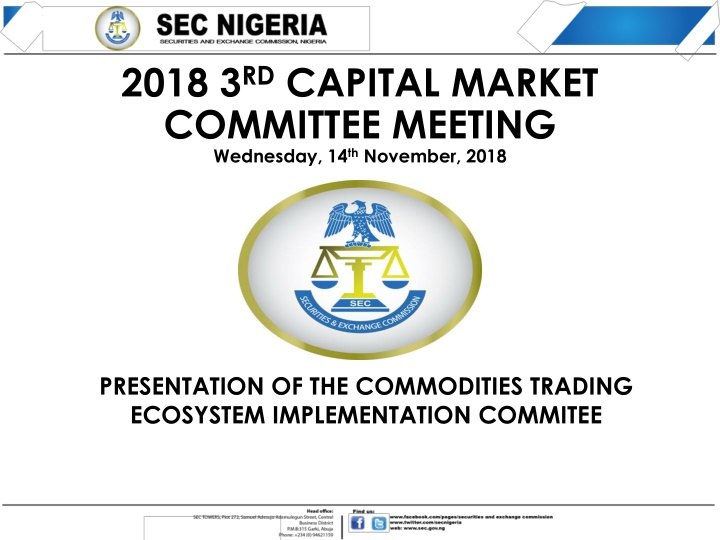

![Guardians of Collection Enhancing Your Trading Card Experience with the Explorer Sleeve Bundle [4-pack]](/thumb/3698/guardians-of-collection-enhancing-your-trading-card-experience-with-the-explorer-sleeve-bundle-4-pack.jpg)
